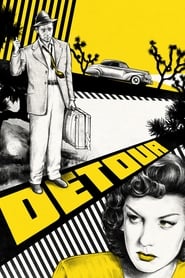Detour was filmed in less than a week, and it's difficult to decide, out of the actors and the screenplay, is its weakest point... yet it still somehow seemed to drag me in.
The plot revolves around luckless Al who is hitchhiking to California, and he gets a lift from a man called Haskell who quickly falls down dead from a heart attack. Al buries the body and takes Haskell's money, car and identification, believing that the police will believe Al murdered him. An unstable element is soon introduced in the guise of Vera, who, through a set of coincidences that stretches credulity, knows that the 'new' Haskell (ie. Al) is not who he seems. Vera attaches herself to Al, blackmailing him, and the world starts to spin out of Al's control.
Yet what makes Detour so interesting to watch, however, is that its 'errors' lend a distinctively creepy and unnatural vibe to the film. Indeed, in the early twentieth century, Sigmund Freud used the word unheimlich to describe the experience of something that is not simply mysterious, but something creepy in a strangely familiar way. This is almost the perfect description of watching Detour: its eerie nature means that we are not only frequently second-guessed about where the film is going, but are often uncertain whether we are watching the usual objective perspective offered by cinema.
In particular, are all the ham-fisted segues, stilted dialogue and difficult-to-explain character motivations actually a product of Al inventing a story? Specifically, did he murder Haskell after all, despite the film 'showing' us that Haskell died of natural causes? Are we watching what Al wants us to believe? Regardless of the answers to these questions, the film succeeds precisely because of its accidental or inadvertent choices, so it is another implicit reminder that seeking the director's original intention in any piece of art is a complete mirage. And in that light, Detour is certainly not a 'good' film, but it just might be a great one. (It is a short film as well, and, out of copyright, it is available online for free.)

